Redditor Didn't Allow His SIL To Visit Their New Home With An Unhealthy Dog
Dog owners know that if they want their dogs to be happy and content, the main factor is not only providing them with a warm home and food; they also need their humans' presence and to feel the same way too. That's the unconditional love that all dog owners can brag about.
When dogs feel the affection of their owners, these four-legged buddies will do anything for their families to show them the same. Additionally, they always go above and beyond to make their owners happy.
Once a dog develops a tight bond with a caring owner, their devotion becomes unshakeable, and they will stick by the owner's side no matter what. But that's exactly what dog owners should do, too.
If your dog needs you, you cannot turn your back on him and leave him alone. That often means that you have to waive some social events or gatherings where you can't bring your dog.
In a similar situation found himself a Reddit user who wanted to know if his reaction was too harsh. His sister-in-law wanted to visit them with her dog so he wouldn't be home alone while her parents were away.
But the problem is that the dog has urethral incontinence, and since they recently moved into a new house, he told her not to bring him with her. It was only for one night, but he still wonders if he should have allowed her to visit with the dog despite his health issues.
Original post:

"I told her she could not bring it"
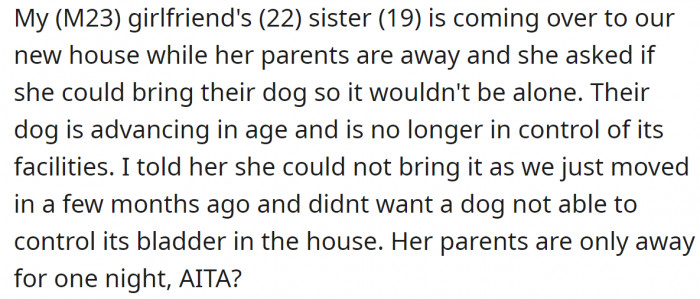
This can be an option:

Boundaries and Behavioral Expectations
Dr. James Carter, a family therapist, explains that setting boundaries is a vital component of maintaining healthy relationships, especially when pets are involved.
Research indicates that establishing clear expectations can help prevent misunderstandings and foster a respectful environment.
In this case, the Redditor's stance on not allowing an unhealthy dog into their new home reflects a protective instinct that is essential for both the pet and the household.
Understanding Boundaries in Relationships
This situation illustrates the importance of personal boundaries, particularly when it comes to caring for pets and family members. The Redditor's decision not to allow their sister-in-law to visit with an unhealthy dog reflects a protective instinct for their new home.
Research in the field of psychology emphasizes that setting boundaries is crucial for maintaining healthy relationships, especially during transitional periods such as moving into a new home. Boundaries help individuals articulate their needs and protect their emotional and physical space.
Someone else also agreed:

"It's a bad idea to bring an old and infirm animal to a new house anyway."
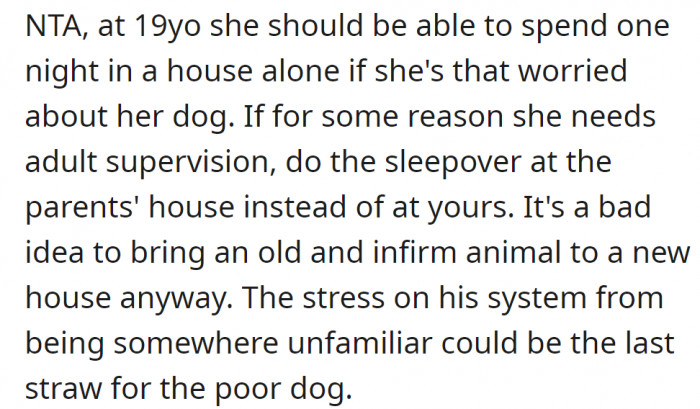
"I've had a dog that lost control of his bladder towards the end, and I would have never expected someone else to be okay with that in their own home."
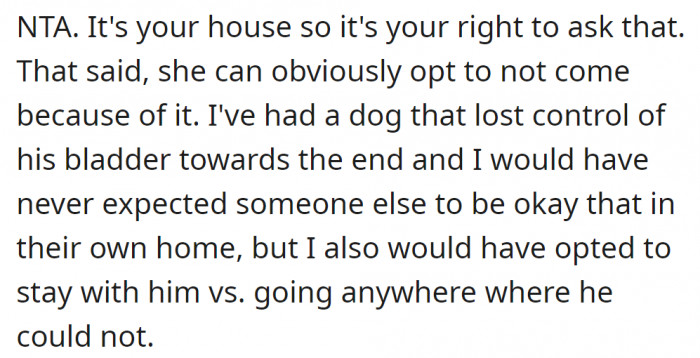
Psychologists emphasize that the emotional weight of a pet's health can complicate familial relationships. According to Dr. Daniel Goleman, an emotional intelligence expert, "The emotional bonds we form with our pets can create significant stress when health issues arise, especially within family dynamics." Individuals often feel torn between compassion for a family member and the obligation to protect their own environment. This internal conflict can lead to feelings of guilt or resentment if not navigated carefully, as noted by Dr. Amy Cuddy, a social psychologist, who states, "Navigating these emotional landscapes requires careful consideration and communication to maintain healthy relationships."
Moreover, the concept of boundary-setting is supported by studies in family psychology, which show that clearly defined boundaries can lead to healthier interactions and reduce conflict. When individuals feel their needs are respected, it fosters a sense of safety and trust in relationships.
Conversely, when boundaries are ignored, it can lead to feelings of resentment and frustration, as seen in this scenario.
"It would be better if your gf stays with her at their parent's place."
The involuntary flow of urine is known as incontinence. Therefore, if your dog is incontinent, it implies that they aren't even conscious of urinating.
This incontinence frequently happens when pets are relaxing (for example, in their bed or on the couch), and the volume of urine that leaks is typically normal or substantial. There are numerous reasons why dogs become incontinent:
- Infection of the urinary tract
- Uroliths
- Excessive water consumption (which can be caused by diabetes mellitus, Cushing's disease, hyperadrenocorticism, diabetes insipidus, and renal failure)
- Injury or disease of the spinal cord (inflammation, trauma, pain, vertebral abnormality, paralysis, cancer)
- Ectopic ureters and other structural flaws
- A weak bladder sphincter.
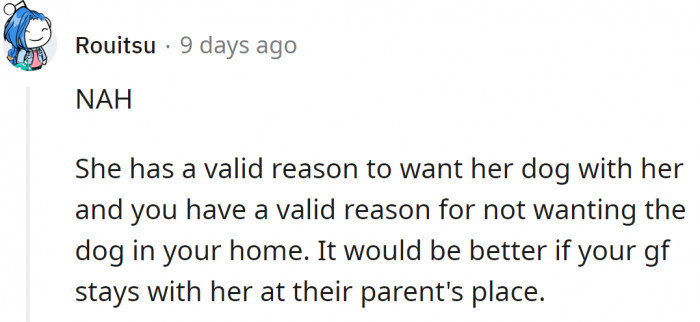
These were the right questions; unfortunately, the OP didn't respond.
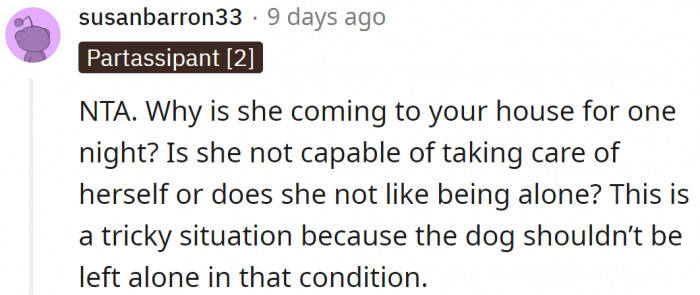
All in all, the other Redditors supported his decision to tell his sister-in-law not to bring the dog with her to their new home. In other circumstances, it wouldn't be a problem, but the dog's medical condition is not the best, so it could affect him as well.
But what do you think regarding this whole not-so-pleasant situation?
Navigating Family Dynamics
This scenario also highlights the complexities of family dynamics. Family relationships are often layered with emotional ties that can complicate decision-making processes. Understanding these dynamics can help individuals navigate their feelings more effectively.
As noted by Dr. Laura Berman, a renowned sex therapist, "Family dynamics can often reflect our own insecurities and needs, leading to misunderstandings." This sentiment is echoed by Dr. Tina Payne Bryson, a child development expert, who states, "When we understand the emotional undercurrents in our family interactions, we can communicate more effectively and foster healthier relationships."
To address these complexities, effective communication is critical. Engaging in open dialogues about feelings and expectations can provide clarity and foster mutual understanding among family members.
Utilizing 'I' statements can also be beneficial in expressing needs without placing blame. For example, saying, 'I feel concerned about the dog's health' can open the floor for a more productive discussion.
Psychological Analysis
This situation reflects a common challenge in family dynamics where boundaries are tested. It's essential for individuals to communicate their limits clearly to avoid misunderstandings and resentment.
Encouraging open dialogue about needs and expectations can help foster healthier relationships, especially in times of transition.
Analysis generated by AI
Analysis & Alternative Approaches
In summary, this scenario highlights the significance of boundary-setting within family relationships. By fostering open communication and respecting each other's needs, families can navigate challenging situations more effectively.
Ultimately, establishing clear boundaries not only protects individual well-being but also strengthens familial ties.
Communicating Boundaries Effectively
To avoid conflict, experts recommend communicating boundaries clearly and compassionately.
Research shows that using 'I' statements can help convey personal feelings without placing blame.
For instance, saying 'I feel uncomfortable with the idea of an unhealthy dog in my home' may lead to a more productive conversation than a directive statement.
Analysis & Alternative Approaches
Understanding the importance of boundaries can significantly impact family dynamics.
As noted in psychological literature, clear communication about personal limits is essential for maintaining healthy relationships.
By fostering open dialogues about boundaries, families can navigate difficult topics with greater ease and understanding.



